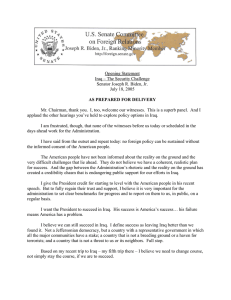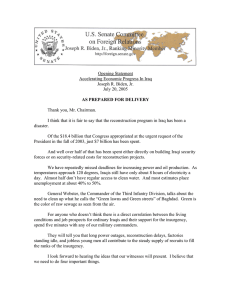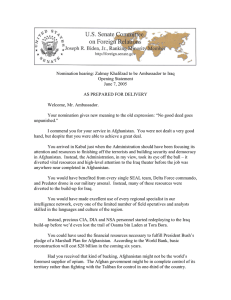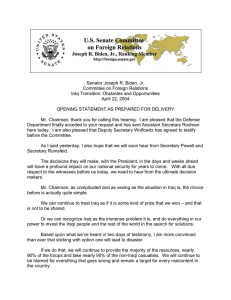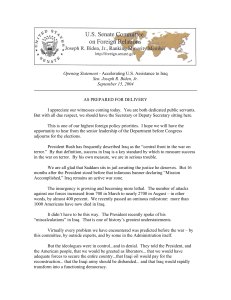An Effective US Strategy for Iraq” ANTHONY H. CORDESMAN
advertisement
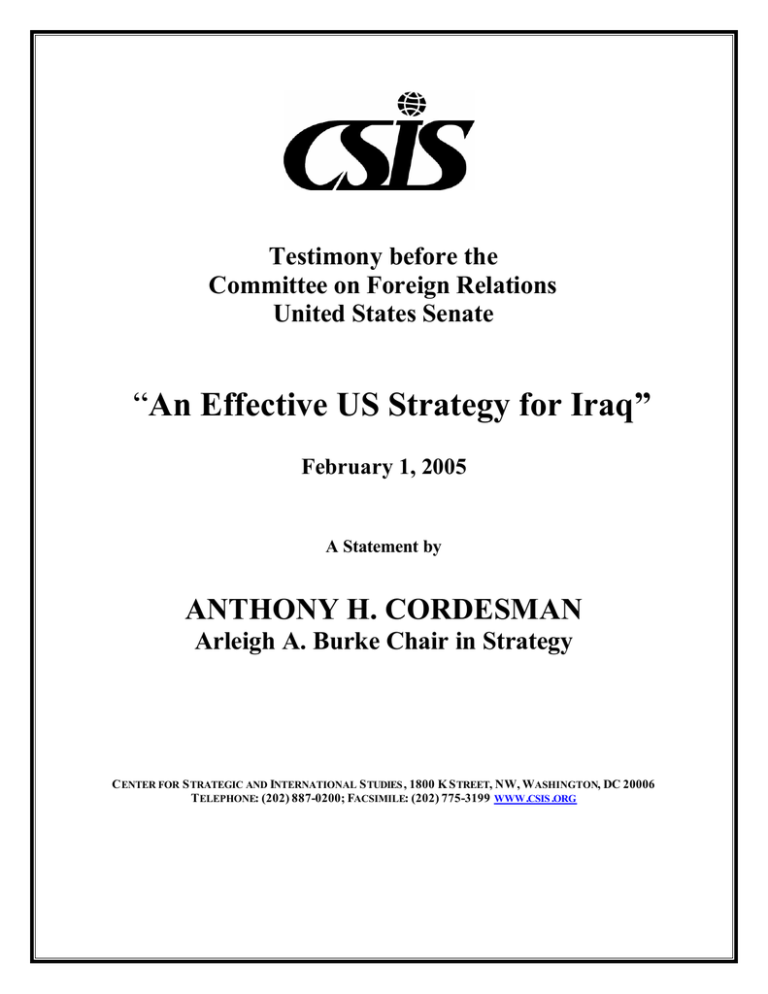
Testimony before the Committee on Foreign Relations United States Senate “An Effective US Strategy for Iraq” February 1, 2005 A Statement by ANTHONY H. CORDESMAN Arleigh A. Burke Chair in Strategy C ENTER FOR S TRATEGIC AND INTERNATIONAL S TUDIES , 1800 K S TREET, NW, WASHINGTON, DC 20006 TELEPHONE: (202) 887-0200; FACSIMILE: (202) 775-3199 WWW .CSIS .ORG Several months ago, I laid out the basic elements of a strategy for dealing with Iraq in an analysis which I called “Playing the Course”—a paper that I now request be placed in the record of this hearing. In doing so, I pointed out that the odds of success in Iraq are a best even—if one accepts the fact that in the real world the only definition of success we can actually hope to achieve is means some form of pluralistic Iraqi government that can work its way through years of political and economic difficulty without direct American military support. An Exit is Not a Strategy I also pointed out that the US must be prepared for failure in Iraq, but that exiting is a tactic and not a strategy. Exiting Iraq would eliminate US casualties and the cost of war fighting, but create as many or more problems as it solves. Leaving a legacy of political failure, chaos, or civil conflict in Iraq is not a strategy. A strategy means that we must reassess and rebuild our entire position in the Middle East and Southwest Asia, restructure our security policy and regional posture in an area with some 60% of the world’s proven oil reserves, deal with what Islamist extremism will claim as a massive victory, cope with a nuclear Iran, and find some way to reestablish our credibility in the world. “Cut and run” may become a necessity, but it can never be a strategy; only a massive defeat. This is why I have argued that we must do our best to salvage the situation in Iraq, and to correct our past mistakes. We should not do this at any cost; but we should not abandon Iraq as long as there is any serious hope of success. Facing the Consequences of Our Own Mistakes We also should recognize that we are where we are today as much because of nearly two years of avoidable failures in US policy and leadership as because of the inherent difficulties in helping Iraq become a stable and successful nation. In summary, we have made nine major mistakes: • We went to war on the basis of the wrong intelligence and with a rationale we could not defend to the world or the Iraqis. • We bypassed the Interagency process. We ignored warning after warning by US intelligence experts, State Department officials, military officers with experience in the region, and outside experts that we would not be greeted as liberators fighting a just war, but by a highly nationalistic and divided people who did not want outsiders and occupiers to determine their destiny. • We planned fought the war to remove Saddam from power without any meaningful plan for stability operations and nation building. We allowed political and economic chaos to take place as we advanced and in the immediate aftermath of Saddam’s fall. • We did not prepare our military forces for civil- military missions, to deal with terrorism and insurgency, to play the role of occupier in a nation with an alien Cordesman: Effective US Strategy for Iraq 2/1/05 Page 3 religion, language and culture, or the have the mix of HUMINT and weapons they needed for the "war after the war." As a result, we forced our military to slowly adapt under pressure and in the face of a growing enemy. • For a year, we assumed that a proconsul in the form of the CPA could govern Iraq and plan its future, rather than Iraqis. We staffed much of the CPA with inexperienced political appointees and ideologues that spent virtually all of their time in a secure enclave and only served for brief three to six month tours. • For a year, we developed idealized plans for political reform that did not survive engagement with reality. We focused far too much on national elections and drafting a constitution without having a similar focus on effective governance at the national, regional, and local levels. • For a year, we had military leadership in Iraq that would not work closely with the leadership of the CPA, and which lived in a state of denial about the level of popular hostility we faced and a steadily growing insurgency. • For a year, we made no serious attempt to create Iraqi military, security, and police forces that could stand on their own in dealing with a growing insurgency, terrorism, and lawlessness. Instead, we saw such Iraq forces largely as a potential threat to our idealized democracy and felt our forces could easily defeat an insurgency of 5,000-6,000 former regime loyalists. • For a year, we tried to deal with an Iraqi economy that was a command kleptocracy as if it could be quickly and easily converted to a modern marketdriven economy. We sent in CPA advisors with no real experience and no continuity. We created a ridiculous long-term aid plan without a meaningful understanding or survey of the economic problems Iraq faced, an understanding of Iraqi needs and expectations, and the talent in either the US government or the contract community to implement such a plan or develop the kind of plans and programs focused on short and medium-term requirements that Iraq actually needed. The Past Does Not Have to Be Prologue to the Future This past does not have to be a prologue to the future. During 2004, we began to correct many of our past mistakes. • We have moved Iraqi policy beyond the disastrous policy cluster in the Pentagon, weakened the hold of failed neoconservatives, and begun to implement a serious Interagency approach. • We have an ambassador and a commander that can work together, and much more of a true civil- military team. We still lack the civilian elements that can support nation building in high-threat areas, but the US military has found ways to partially compensate. • We have given sovereignty to the Iraqis and let them take over the political process. Cordesman: Effective US Strategy for Iraq 2/1/05 Page 4 • We have gradually accepted the true complexity of the political problems in Iraq, the level of popular hostility we and our forces face, and the seriousness of the insurgent threat. • We have reorganized the US and Coalition military posture in Iraq to fight a serious counterinsurgency and counterterrorist war, and we have begun to rethink our entire process of force transformation to shift from a Cold War focus on advanced technology to fight conventional forces to one that can deal with the very different asymmetric, political, and ideological threats we actually face. • We have begun to train Iraqi military, security, and police forces for the threat they actually face, and not for a perfect secure, stable, and democratic world. • We have partially understood that our aid plans were totally unrealistic, and that priority must be given to short and medium term stability and to using dollars as a substitute and supplement to bullets. We have at least begun to understand that USAID in Washington cannot deal with the challenge it faces, that outside contractors cannot manage an effective aid program in Iraq, and that dollars need to go to Iraqis and not outsiders. We need to give the Americans now in Iraq—and especially the civilians and military actually in the field outside the Green Zone—full credit for these changes. They have not stood idly by, failed to adapt, or failed to challenge the many failures in leadership they received from Washington. America’s “neoconservatives” may be an unmitigated national disaster in shaping policy towards Iraq, and in virtually every other aspect of foreign policy they have managed to affect. We have seen, however, that realists, true area experts, and adaptive military professionals can produce far better answers and have already begun to compensate for many of our past mistakes. What Must Be Done The question now is what must be done to reinforce the steps we have already taken. I should stress that my proposed answers have had to be formulated in a climate where there is remarkably little realistic US government reporting of the metrics necessary to understand the true nature of the insurgency. We have little meaningful data on the results of our efforts to create effective Iraqi forces, the economic problems Iraq faces, and the actual impact of our aid. We have substituted self-serving polls to justify our positions rather than to seriously and objectively poll Iraqi perceptions. I have prepared a short paper on what needs to be done to improve the quality of the reporting to the American people and the Congress, and again, I request that it be included in the record. Yet, I believe that enough data are available to show that there are five steps that might well increase our chances of success well beyond the 50-50 level, and that clearly need to be taken immediately if we are to move towards success during the coming year: Cordesman: Effective US Strategy for Iraq • 2/1/05 Page 5 We must do everything we can to demonstrate the independence of the emerging Iraqi political structure while encouraging inclusiveness and some form of federalism, and aiding in the process of governance. Our fascination with elections needs to be matched with a practical focus on aiding governa nce while we steadily phase down any high level intervention or pressure on the Iraqi government. Iraqis do not measure legitimacy primarily in terms of elections. They measure it terms of the actual ability to govern, to give all Iraqis a fair share of wealth and power, to provide personal security, to provide employment and economic opportunity, to furnish education and health services, and to provide water, electricity and sewers. They also measure legitimacy in terms of the ability of an Iraqi government to implement independent policies, to disagree with the US and outside powers, and visibly take decisions without anyone looking over the Iraqi government’s shoulder. We cannot cease to advise, but we must cease to impose. Where outside support is needed, it also will always be better if it comes from the UN, the British, or some broader international effort and not from unilateral action by the US. Every other thing we do will fail if the Iraqis cannot stand alone and visibly do so. We cannot save a government from itself, and we will destroy it if we try to do so. • We need a clear plan to create the kind of independent Iraqi military, security, and police forces that can replace the US and Coalition forces except when they are needed in an advisory role. We need to stop lying to the Iraqis, the American people, and the world about our efforts to create Iraqi forces. We do not have 127,000 useful or meaningful men in these forces of the kind needed to fight an aggressive, experienced, and well-armed threat. We have somewhere around 7-11,000 that are beginning to have the training and some of the equipment necessary to directly engage insurgent forces. We have about two to three battalions that can honestly stand alone in the face of serious insurgent attack, and the first battalion with the armor necessary to survive went into service in mid-January. I have prepared a detailed analysis of what has gone wrong and right with this effort, and again, I ask that it be included in the record. The key point pf this analysis, however, is simple: Everything we do in Iraq will fail unless we development a convincing plan to create Iraqi forces with the leadership, experience, equipment, and facilities they need to secure their country without us and actually implement it. Creating effective Iraqi forces to replace the Coalition forces is the sine qua non for American action. There is no more devastating critique of the ongoing failures in US policy than the lack of such a plan in public form -- if one exists at all. Furthermore, it must be a plan that shows the Iraqi people, the region, and the Congress and American people that we can achieve a meaningful form of victory in Iraq. Cordesman: Effective US Strategy for Iraq 2/1/05 Page 6 Equipment and facilities are not a casual issue. Nothing we have done to date has begun to be adequate. In fact, as an American, I find it contemptible that we so often criticize Iraqi forces for their behavior when we send them out to facilities that cannot be protected in unprotected vehicles that no American would willingly use with weapons inferior to their enemies. We then refuse to accurately report Iraqi casualties along with our own, treating their losses as less significant than ours. Would any Senator or Congressman send their son or daughter out under these conditions if they were Iraqi? Would any member of Congress expect their son or daughter to stand and die without purpose? The time has come for the Administration to explain exactly how our current plans will meet the need for strong and independent Iraqi forces, and when Iraqi forces will be given the equipment, facilities, and capabilities they really need to defeat the insurgents on their own. • We need to complete the reorganization of our aid effort to focus on bringing short and near-term stability and to support the counterinsurgency campaign, and seriously consider replacing USAID's leadership of the Iraq aid effort. Politics, governance, and security are critical, but so are economics. We need a program to meet Iraq’s immediate economic needs, to help bring security, and that is run and implemented by Iraqis in ways that provide virtually all of the money to Iraqis. Let me make it clear that I have nothing but respect for those USAID and contract personnel in the field in Iraq who have actually implemented useful projects, and done so at the risk of their lives. Many have become combatant “noncombatants” in a world where armed peacekeeping, nation building, and humanitarian intervention have become all too common. I also appreciate the fact that the almost mindless focus on long-term aid efforts that shaped our initial aid requests has been replaced with substantial reprogramming for short-term projects that meet Iraqi needs, give the money to Iraqis, bring stability and support security efforts. Anyone who looks at the USAID web page, however, sees nothing but a long list of plans and project efforts that are not tied to measures of effectiveness or defendable requirements. USAID in Washington seems to live in a Panglossian fantasy world where no problems and challenges really exist and no public strategy, plans, and metrics of success are needed. We need economic stability for a nation of nearly 26 million people whose overall infrastructure is better suited to 16-18 million. We need jobs for a 7.8 millionperson Iraqi work force that now has 30-40% unemployment. What we still have is an aid program based on American decisions about what is necessary run largely by foreign contractors with far too much money going to non-Iraqis— much simply to protect projects that end up being sabotaged or dysfunctional. The good news is that we have so far only disbursed $2.5 billion out of $18.4 billion in FY2004 aid. The bad news is that the money is desperately needed in Cordesman: Effective US Strategy for Iraq 2/1/05 Page 7 Iraq, and that our projects only hire around 121,000 workers out of a work force of 7.8 million and the total has recently dropped by 8,000-10,000 a week. I would urge this Committee to demand an immediate appearance by the Director of USAID to explain the details of our aid program to Iraq, to provide a clear plan for transferring the funds and responsibility to the Iraqi government, to show we actually know how well our projects met valid requirements, and prove that USAID’s leadership is competent. If he cannot answer these questions to the Committee's satisfaction, the aid program in Iraq should immediately be transferred to different hands. • We need a clear declaration of our goals and principles. We do not need declarations of American values or general good intentions. We need clear and unambiguous statements from the President and Secretary of State that refute the key conspiracy theories that poison our relations and undercut the legitimacy of the Iraqi government. To be specific, we need a clear statement from the President that we will leave the moment the Iraqi government asks us to; that we will phase down our forces as soon as Iraqi forces are ready to do the job; that we will not maintain any permanent military bases; that we will not exploit Iraqi oil wealth or economy in any way; and that we are shifting our aid funds to Iraqi control and to benefit Iraqis –insisting only that the uses be validated and their be no corruption and waste. These are obvious points, but we have either made them poorly, in passing, or at too low a level to be meaningful. • Finally, we must give settling the Arab-Israeli conflict top priority, make our efforts fully visible, and seek to act through the Quartet of the US, EU, UN, and Russia wherever possible. In spite of our intervention in Iraq, no single issue creates more anger and hostility towards the US, or does more to aid extremists and terrorists like Bin Laden, than the lack of visible, high- level US efforts to revitalize the peace process and the perception that the US fights terrorism but does nothing to halt settlements and “occupation.” We must not halt our struggle against terrorism, or do anything to compromise the security of Israel. We can only establish credibility in Iraq, the Arab world, and Islamic world, however, if we both adopt the right polices towards Iraq and towards the Arab-Israeli conflict, and if we show the same balance in our dealings with Israel and the Palestinians as we did at Camp David and Tabah. Planning for Withdrawal Let me conclude by saying that neither the positive actions we have taken during 2004, nor the proposals I have just made can guarantee success. We are beginning late and we have wasted precious time we did not have. Success was always uncertain, and the idea Iraq would suddenly emerge as a success that would transform the Middle East was always a fantasy that did little more than prove just how decoupled from reality America’s “neoconservatives” could be. Cordesman: Effective US Strategy for Iraq 2/1/05 Page 8 We may well have to leave Iraq without achieving the limited definition of success I gave at the beginning of this testimony. If an elected Iraqi government asks us to leave, we must do so as quickly and with as much integrity as possible. The same is true if we are asked to compromise our military effectiveness or the integrity of our aid process. Failure is an option, and will scarcely be the only time the US has faced defeat. Abandonment, however, is not an option. If we are forced to leave Iraq, we should not do so in bitterness or in anger. We should be prepared to offer aid and assistance. We should make it clear that we will do what we can regardless of the circumstances. As Vietnam and China have shown, history endures long beyond anger and frustration, and so do our vital strategic interests. In any case, even under the best conditions, we must leave in the next two to three years, and as soon as Iraqi forces can replace us. This is not a choice. Being an advisor and a friend is both possible and desirable. However, no policy in Iraq, this region, or the world can succeed where the US seeks to keep bases or remains an “occupier.” We need to prepare for this contingency now, and the key to that preparation is two fold: • First, it is to deal with the Israeli-Palestinian conflict in ways that can ease the anger against us in the Arab and Islamic worlds, and ultimately give Israel true security. • Second, it is to rebuild and strengthen our relations with the Southern Gulf states and our other allies in the Arab world. This second key to success is the subject for another hearing, but that we need to act now to make it clear that we will ensure the security of our Southern Gulf allies in every way we can regardless of what happens in Iraq. We will not withdraw; we will not leave them without protection against a nuclear Iran; and we fully understand how vital they are at a time when 40% of all the world’s oil exports pass daily through the Strait of Hormuz and our Department of Energy projects that that percentage will raise to nearly 60% by 2025. Finally, it would be to our vast benefit if the Administration and the Congress government could be far more cautious about talking about political reform and democracy in ways our enemies use to say we seek to overthrow governments in the region and impose our own leaders. What we need are practical country-by-country efforts to quietly and steadily support the reformers actually in those countries—not noisy outside exiles. We need to press for achievable evolutionary progress. We need to give human rights, the rule of law, economic reform, and demographic reform at least the same priority as democracy, and we need to recognize that democracy cannot work without meaningful political parties and preparation. To be blunt, we need a lot less lofty rhetoric, and a lot more pragmatic action. We need country-by-country strategies and plans that move progressively towards balanced and stable reform. We need country teams in each embassy that can work with both friendly governments and local reformers on a quiet and steady evolutionary basis. We need to work with regional experts and media, our allies, and international institutions. We don't need slogans; we need meaningful action.


